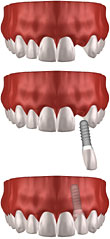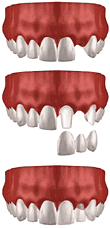
Implant supported single tooth restoration - Adjacent teeth are untouched

Traditional fixed bridge, which requires cutting down healthy tooth structure of adjacent teeth
Implant Dentistry in Plainview, Huntington, Melville, Hicksville, Woodbury, Levittown, Bethpage, Farmingdale, NY, and surrounding areas.
Implants - FAQ's
What are the advantages of dental implants?
Dental implants look and feel like your own teeth. They can help prevent the bone loss and gum recession that often accompanies bridgework or dentures. In addition, they don't sacrifice the quality of your adjacent teeth like a bridge because neighboring teeth are not altered to support the implant. Implants are secure and offer freedom from the clicks and wobbles of dentures and the success rate of implant is highly predictable. We provide the best implant dentistry in Long Island.
Many patients are concerned because they want dental implants, but do not know if they are good candidates. This will be determined by Dr. Sachs and your dentist. If, like many others, you feel implant dentistry in Long Island is the choice for you, we ask that you undergo a dental/radiographic examination and health history. In addition to standard radiographs, Dr. Sachs uses a highly sophisticated imaging program called Simplant. Simplant allows Dr. Sachs to analyze CAT scan data directly on the computer and simulate implant placement before any treatment takes place. This sophisticated technology allows Dr. Sachs to determine your body's ability to support a dental implant before any treatment takes place. He can analyze bone density and volume very accurately. This helps assure many years of comfort and function form your dental implants. Following the diagnostic phase, Dr. Sachs will work closely with your dentist to formulate your treatment plan. He will then present his findings to you during a treatment conference. Your specific needs and considerations will be addressed by your doctor. Your questions and concerns are important to use and our team will work with you very closely to help make your procedure a success. We will also discuss fees and insurance at this time. There are many types of insurance plans, and coverage for implants is varied. We will be happy to assist you in obtaining any benefits to which you may be entitled.
How are dental implants placed?
The implants are titanium posts that are inserted into the bone. Implants act as tooth root substitutes. The implant only replaces the root of the missing tooth. The gum and bone is made numb with local anesthetic, and the implant is gently inserted into the bone where it will undergo a process called osseointegration. This means that the bone grows onto the surface of the implant, and takes between six weeks to four months, in most instances depending on the condition of the bone. Sometimes the implants are submerged under the gum during this healing phase, and sometimes they are left exposed flush with the gums. If they are submerged, then a second procedure will be needed to expose the implant after it has integrated with the bone. If the implant was not submerged, the prosthetic phase can begin once osseointegration is complete. Many times a single tooth can be replaced with 3 visits and only 8-12 weeks of time.
How are dental implants restored?
Your dentist will make the replacement teeth that are held in place by the dental implants. This will take varying lengths of time depending on the type of restoration planned. Your dentist will discuss this with you before treatment begins. Your implant restoration may be cemented onto the the implant(s), or it may be screwed into place. Implants can be used to replace a single tooth, a segment of missing teeth, or a whole arch of missing teeth. Implants can also be used to secure a loose denture.
How do I care for my dental implants?
Dental implants are like your own teeth and will require the same care and ongoing maintenance if you are to realize their full benefit over many decades. In order to keep your implant clean and plaque-free, proper care at home, including brushing and flossing still apply. An oral irrigator (i.e., Water Pik) is highly recommended following flossing. In addition, professional maintenance several times a year is essential. Dr. Sachs will work closely with your dentist to custom tailor your maintenance program to your specific needs.
If you have any more questions about implant dentistry in Long Island contact us today.





